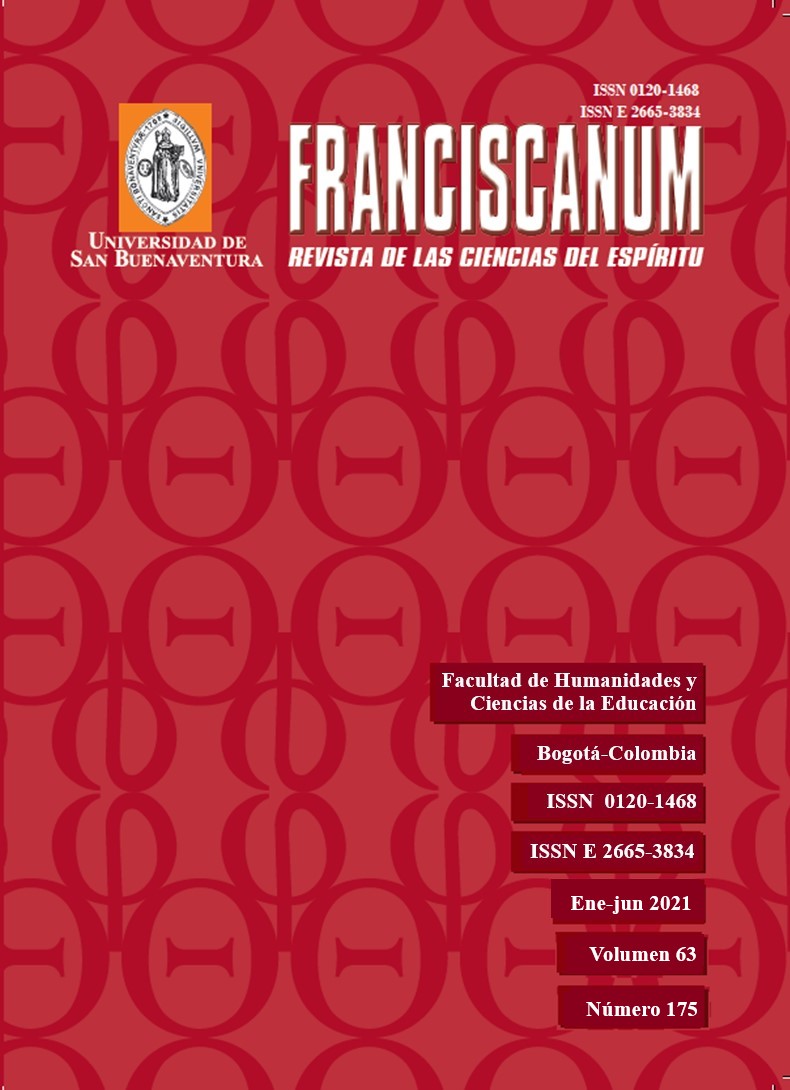This journal provides immediate open access to its content, based on the principle that giving the public free access to research helps a greater global exchange of knowledge.
Therefore, the Creative Commons 4.0 Attribution Attribution - Equal Share (by-sa) License is accepted: The commercial use of the work and the possible derived works is permitted, the distribution of which must be done with a license equal to that regulates the original work.
http://creativecommons.org/licenses/by-sa/4.0/
Along these same lines and in line with the Open Access policy, it is clarified that the authors maintain their rights to articles, without restrictions and, in the same way, they maintain their publication rights, without restrictions. They are only asked to reference the number of the Franciscanum magazine where the article initially appeared.
Abstract
Under the hypothesis that human reality and divine reality make up a circular structure, this study covers some of the milestones of Xavier Zubiri's first philosophy to show that, indeed, man as a human reality, constitutively relegated to the power of the real as its ultimate and enabling foundation, it has a theologal dimension, not theological, in which it is offered with clarity and evidence that God is a problem for man, that this is inexorably launched, in his own life, towards that problem and that the course of that life is really the resolution of that problem.
References
Aristóteles. Metafísica. Madrid: Gredos, 2003.
Aristóteles. Tratados de Lógica (Órganon). Categorías. Tópicos. Sobre las refutaciones sofísticas. Madrid: Gredos, 1982.
Cabria, José Luis. Relación filosofía-teología en el pensamiento de Xavier Zubiri. Roma: EPUG, 1997.
Düring, Ingemar. Aristóteles. México: UNAM, 2005.
González, Antonio. «Los orígenes de la reflexión teológica de Zubiri». Theologica Xaveriana 179 (2015): 209-250. http://dx.doi.org/10.11144/ja- veriana.tx65-179.ortz
Heidegger, Martin. «La esencia del habla». En De camino al habla. Barcelona: Ed. del Serbal, 2002.
Heidegger, Martin. Ser y Tiempo. Madrid: Trotta, 2003.
Marquínez Argote, Germán. «“Inteligencia sentiente” de X. Zubiri: desde una perspectiva lingüística». En Cuadernos de Filosofía Latinoamericana 109, Vol. 34 (2013): 103-126.
Olaya, V. G. «Los neandertales no creían en Dios». En El País. 29 de mayo de 2019. Consultada en julio 3, 2019. https://elpais.com/cultura/2019/05/29/actualidad/1559124789_481938.html
Pascal, Blas. Pensamientos sobre la religión y otros asuntos. Las cartas provinciales. Buenos Aires: El Ateneo, 1948.
Platón. Diálogos I. Apología, et altera. Madrid: Gredos, 1981.
Pintor-Ramos, Antonio. «Dios como problema en Zubiri». Universitas Philosopica, 4, Vol. 2 (1985): 29-44.
Ratzinger, Joseph. El Dios de la fe y el Dios de los filósofos. Madrid: Encuentro, 2006.
Ramis, J. P. «Reflexiones sobre el trasfondo político en el juicio contra Sócrates». Atenea 491 (2005): 57-69.
Santo Tomás de Aquino. Suma de Teología. I. Parte I. Madrid: BAC, 2010.
Solari, Enzo. La raíz de lo sagrado. Contribuciones de Zubiri a la filosofía de la religión. Santiago de Chile: UCN-RiLeditores, 2010.
Villa Sánchez, José Alfonso. «Habitados por el tiempo y la eternidad». Reflexiones Marginales 51 (2019). Consultada en julio 2, 2019. https://2018.reflexionesmarginales.com/habitados-por-el-tiempo-y-la-eternidad/.
Zubiri, Xavier. El Hombre y Dios. Madrid: Alianza, 2012.
Zubiri, Xavier. El problema teologal del hombre: Dios, Religión, Cristianismo. Madrid: Alianza, 2015.
Zubiri, Xavier. Inteligencia y Logos. Madrid: Alianza, 2002.
Zubiri, Xavier. Inteligencia y Razón. Madrid: Alianza, 1983.
Zubiri, Xavier. Inteligencia Sentiente. *Inteligencia y Realidad. Madrid: Alianza, 1998.
Zubiri, Xavier. Naturaleza. Historia. Dios. Madrid: Alianza, 1994.
Zubiri, Xavier. Sobre el Hombre. Madrid: Alianza, 2012.
Zubiri, Xavier. Sobre el problema de la filosofía y otros escritos. Madrid: Alianza, 2002.
Zubiri, Xavier. Sobre la Esencia. Madrid: Alianza, 1998.
Zubiri, Xavier. Sobre la Realidad. Madrid: Alianza, 2012.



















